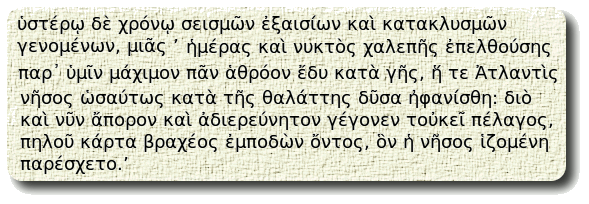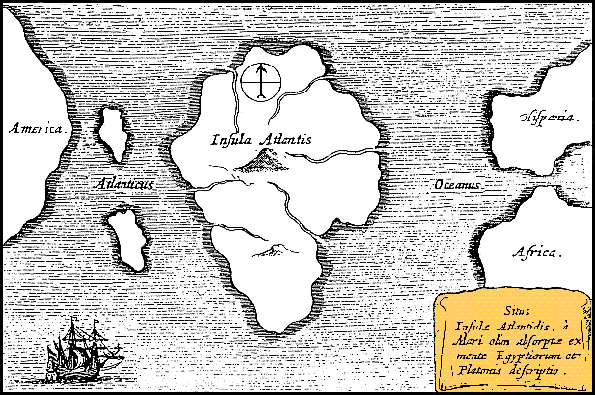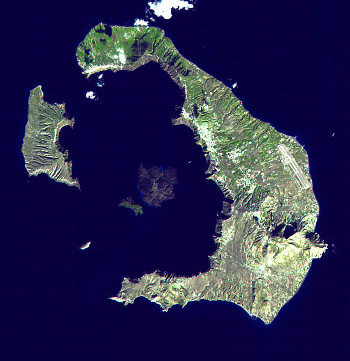Science and the Atlantis Myth
May 18, 2012
Most
scientists are familiar with the
mythical civilization of
Atlantis. Atlantis was a supposedly advanced culture that was wiped off the face of the
Earth by some
cataclysm. The
Minoan civilization, discovered by
archaeologists at the start of the
last century, has been proposed as a remnant
colony of Atlantis. The Minoans were excellent
technologists who were able to construct multi-level dwellings with indoor
plumbing, possibly with greater aplomb than a
Cappadocian hydrological engineer.
Whether or not Atlantis really existed, it did have some influence on science.
Francis Bacon, one of the first proponents of the
scientific method, published his
Utopian novel,
Nova Atlantis, in
Latin in 1624, followed by an
English translation,
New Atlantis, in 1627.
Bacon's novel describes a mythical island nation, Bensalem, which was a
technocracy. This pairing of a Utopia and technology is a theme of many subsequent
science fiction novels. Bacon may have sought to establish such an enlightened nation in the
New World, since he was party to the establishment of
Newfoundland, and he may have participated in the drafting of the
charters for the
Virginia Colony.
The Atlantis myth started with an
account by
Plato in his
Timaeus. Plato, who likely took his inspiration from myths in an
oral tradition, described the demise of Atlantis at about 9,600
BC, about seven
millennia before his time. Atlantis sank into the
ocean "in a single day and night" after a failed invasion of
Athens.[1]

Portion of Plato's Timaeus recalling the demise of Atlantis. (Via Project Perseus).[1)]
That the only published record of Atlantis was Plato's retelling of an ancient myth was no impediment to widespread speculation as to the nature and sudden destruction of this civilization. Various locations have been
proposed for Atlantis, including a
continent in the middle of the
Atlantic Ocean.
Sonar scans, among other evidence, now prove that this could not have been the case.

No true historian would do such a thing, but I modified this c. 1669 map of Atlantis by Athanasius Kircher. Kircher's original map had north to the bottom of the map, which might be familiar to astronomers, but it runs contrary to modern sensibility. I've flipped his map. The caption is, "Situs Insulae Atlantidis, a Mari olim absorpte ex mente Egyptiorum et Platonis descriptio," which I translate as "Site of the island of Atlantis, in the sea, from Egyptian sources and Plato's description." Atlantis, in this case, is more like a continent than an island, and it's placed in the middle of the Atlantic Ocean. (Modified Wikimedia Commons image))
Modern interest in Atlantis was sparked by the book,
Atlantis: The Antediluvian World, published in 1882 by
Ignatius L. Donnelly. I have a copy of this book in my library. Donnelly, an amateur scientist and a
Member of the US House of Representatives representing a part of
Minnesota from 1863-1869, ascribed to an Atlantic Ocean location for Atlantis, and he believed that subsequent civilizations derived from Atlantis. I've always thought that
Immanuel Velikovsky's Worlds in Collision was written in the same style as Donnelly's book.
Since Plato is the source closest to the Atlantic tradition, it's worthwhile to mine his text for clues as to its location. Plato wrote that Atlantis had
quarries for
white,
black and
red stone. I can find
rocks of all these colors in my own backyard, but these are
morraine brought down by the last
ice age. A quarry indicates substantial deposits of
ore.
The
island of
Santorini, known in antiquity as Thera, has deposits of
galena, a black mineral,
quartz, which a
mineralogist would call "water white," and large quantities of red
iron oxide.[2] The island was nearly destroyed by a violent
volcanic eruption, thought to be among the most powerful in civilized times, at about 1650 BC. The idea that Atlantis was Thera was first proposed in 1960.

A Landsat image of Santorini (Thera), taken on November 21, 2000.
Santorini is the largest island. The smaller islands are Nea Kameni, Palea Kameni, Therasia and Aspronisi.
(NASA image, via Wikimedia Commons))
It would be unlikely that a 9,000 year old event, as the destruction of Atlantis was thought to be in Plato's time. would still be within human memory. An event about a millennium before may have, giving credence to the identification of Thera with Atlantis. Plato's description of a catastrophe within a single day and night is consistent with a volcanic eruption and ensuing
tsunami, as found in the
geologic record.
In the four millennia since the cataclysmic eruption, there have been infrequent eruptions of the mostly submerged Santorini
caldera. Five such eruptions have happened in the past 600 years, most recently in 1950. The Santorini area experienced a swarm of low-magnitude
earthquakes on January 9, 2011.[3] A recent study reports that the land around the caldera of the Santorini volcano has been rising at a rate of 18
cm (7
inches) per year.[4]
Analysis indicates that this expansion is due to
magma motion 4-5
kilometers (2.5-3.1
miles) below the surface. This does not indicate an Atlantis type eruption, but it could portend larger earthquakes,
landslides, and small tsunamis.[4]
References:
- Verses 25c-25d of Plato's Timaeus, from Plato in Twelve Volumes, vol. 9, W.R.M. Lamb, Translator, (Cambridge, Harvard University Press), 1925, via Project Perseus; Greek text from Platonis Opera, John Burnet, Editor, Oxford University Press, 1903.
"..At a later time there occurred portentous earthquakes and floods, and one grievous day and night befell them, when the whole body of your warriors was swallowed up by the earth, and the island of Atlantis in like manner was swallowed up by the sea and vanished; wherefore also the ocean at that spot has now become impassable and unsearchable, being blocked up by the shoal mud which the island created as it settled down."
- Santorini Minerals 2010, Volcano Discovery Web Site.
- In the Greek isles, a volcano has awakened, American Geophysical Union Press Release, April 16, 2012.
- Andrew V. Newman, Stathis Stiros, Lujia Feng, Panos Psimoulis, Fanis Moschas, Vasso Saltogianni, Yan Jiang, Costas Papazachos, Dimitris Panagiotopoulos, Eleni Karagianni and Domenikos Vamvakaris, "Recent geodetic unrest at Santorini Caldera, Greece," Geophysical Research Letters, vol. 39 (2012), Document No. L06309, 5 pp.
Permanent Link to this article
Linked Keywords: Scientist; mythology; myth; civilization; Atlantis; Earth; cataclysm; Minoan civilization; archaeologist; 20th century; colony; technology; technologist; plumbing; Simpsons; Cappadocian hydrological engineer; Francis Bacon; scientific method; Utopian novel; Nova Atlantis; Latin; English; New Atlantis; technocracy; science fiction; novel; New World; Newfoundland; charter; Virginia Colony; Plato; Timaeus; oral tradition; BC; millennium; millennia; ocean; Athens; Project Perseus; location hypotheses of Atlantis; continent; Atlantic Ocean; Sonar; Athanasius Kircher; north; astronomer; Egypt; Wikimedia Commons; Atlantis: The Antediluvian World; Ignatius L. Donnelly; Member of the US House of Representatives; Minnesota; Immanuel Velikovsky; Worlds in Collision; quarry; white; black; red; rock; morraine; ice age; ore; island; Santorini; galena; quartz; mineralogy; mineralogist; iron oxide; volcanic eruption; Landsat; NASA; tsunami; geologic record; caldera; earthquake; centimeter; cm; inch; magma; kilometer; mile; landslide.